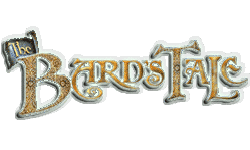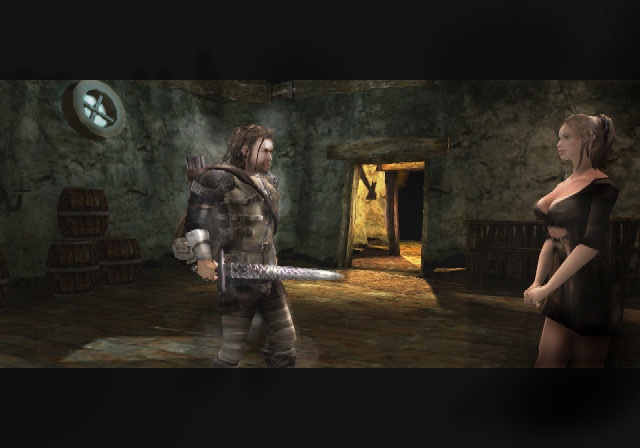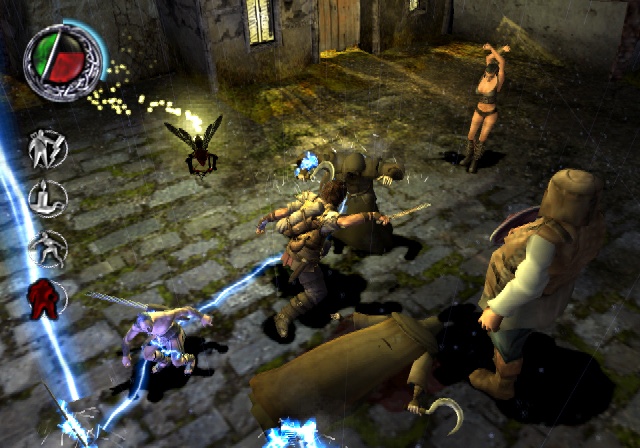|
|

|
BATTLE SYSTEM
|

|
INTERACTION
|

|
ORIGINALITY
|

|
STORY
|

|
MUSIC & SOUND
|

|
VISUALS
|

|
CHALLENGE
|
Unbalanced
|
COMPLETION TIME
|
15-20 hours
|
|
OVERALL
4.0/5
|
Rating definitions
|
|
|
The best introduction for The Bard’s Tale game comes straight from the introduction portion of the game manual: “[The Bard’s] tenure as a barrel maker came to an abrupt end when his barrel mentor Henry, the proprietor of The Barrel Barn, ran him out of town for producing barrels that shattered with a mere whack of a sword. ‘A key won’t even be safe in these things!’ Henry screamed…” Not exactly your typical RPG character history, but then again The Bard’s Tale is not your typical RPG.
Published by inXile Entertainment under the direction of Brian Fargo, creator of the original Bard’s Tale series, this modern incarnation is a complete departure from previous installments. Instead of a traditional turn-based RPG adventure around Skara Brae, this game is an action RPG with an attitude. The Bard is a man whose number one interest is himself, and he makes no apologies for it. Voiced by Cary Elwes of The Princess Bride fame, the Bard frequently breaks the fourth wall by arguing with the sardonic narrator. Much of the game’s concept is aimed at poking fun of modern RPG conventions and clichés.
The Bard is simply a man who is looking for coin and cleavage but gets caught up in worldwide catastrophic events - events which are partly his fault. The story’s basis is the Bard’s quest to free his princess from the bondage of evil sorcerers so that he can retire early with great wealth and the princess being… grateful. Grateful, thrice daily. To free her, he must defeat three guardians atop three towers, travel to new locations, visit the Obligatory Lava Level, etc. InXile based much of the story on the legends of the Scottish Orkney Islands.
 Fringe Benefits for Rat Slaying
Fringe Benefits for Rat Slaying
|
|
Scattered throughout the game are Monty Python style outtakes and sarcastic remarks concerning RPGs. For example, when the Bard opens a treasure chest inside a house, the narrator asks if people appreciate him rifling through their belongings while they stand there. Fitting in with the musical nature of the Bard, several humorous songs are inserted at different points, including “Beer, Beer, Beer,” several songs regaling the sorry lot of “chosen ones,” and one vituperative tune about the idiot who let loose a monster that slaughtered an entire village… ie, the Bard.
Perhaps the best feature of The Bard’s Tale is its writing style and spot-on voice acting. The game (and narrator) never take the Bard seriously, and the Bard only takes his quest for coin and cleavage seriously. The humor may not appeal to everyone, but fans of Monty Python and those able to laugh at RPG clichés will surely enjoy the dialogue. Double entendres abound, and the conversation system allows the player to choose between nice or snarky responses – though nice may mean that the Bard simply insults the other person instead of running him through.
However after the story and conversation, the gameplay breaks down. The Bard’s Tale utilizes the Norrath battle engine, but does not make full use of its potential. In keeping with the musical theme, the Bard is not a mighty warrior or grand wizard. Though he can wield a sword and fire a bow, his main talent is summoning minions via music. These minions perform various roles such as the Knight, the Bodyguard, and a Trap-Finder who finds traps by setting them off – on himself.
 The Bard would have something snarky to say about this...
The Bard would have something snarky to say about this...
|
|
The Bard cannot survive very well without the minions, but they have a tendency to die easily. The Bard can resummon, but he is vulnerable while playing music, so much of combat involves running around trying to avoid monsters while resummoning minions. The game also has some collision detection issues, especially when firing the bow.
Another frustration is that The Bard’s Tale falls prey to some of the very RPG conventions that it seeks to mock. There are periods of randomly imposed time-limits, and conversation choices have only a superficial effect on the story. Game environments are reused when the Bard not only has to fight his way up a tower but back down again. Load times are short, but nearly everything is a separate area so expect to see the loading screen often. Cut-scenes are plentiful but often take too long to set the camera up. Odd pauses, typos, and the occasional graphical glitch take away from an otherwise good game.
Visually, the game does not push the Xbox to its full potential. It is often hard to distinguish between the many characters on screen, and cut-scenes are detailed but unimaginative. The game does feature an excellent soundtrack that fits the theme well, and audio effects provide an absorbing atmosphere.
The Bard’s Tale features three different endings, but the story is not significantly different. After all is said and done, The Bard’s Tale is enjoyable for a single play-through, but the gameplay and extras are probably not enough to entice most gamers for a second round. The Bard’s Tale is recommended for RPGers who will enjoy a Monty Python style comedic RPG that spoofs RPGs.
Review Archives
|









